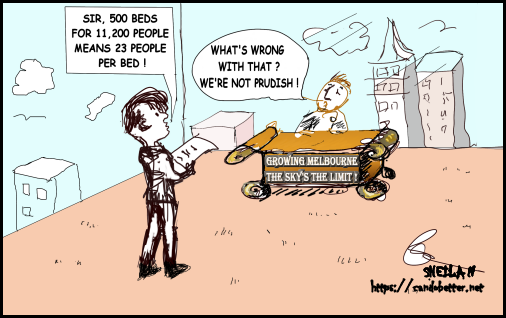 "The Victorian Government has failed to fund 500 housing places for young people living with mental illness almost three years after making the commitment – a key royal commission recommendation." (Council to Homeless Persons, Melbourne City Mission and Orygen) The homelessness press-release says nothing about how massive overseas immigration and investment has driven the excessive demand that has resulted in high prices and housing shortage, but this is the elephant in the room, and the lead in the saddles of those who seek to be heros to the homeless.
"The Victorian Government has failed to fund 500 housing places for young people living with mental illness almost three years after making the commitment – a key royal commission recommendation." (Council to Homeless Persons, Melbourne City Mission and Orygen) The homelessness press-release says nothing about how massive overseas immigration and investment has driven the excessive demand that has resulted in high prices and housing shortage, but this is the elephant in the room, and the lead in the saddles of those who seek to be heros to the homeless.
 In light of this truth, advocates for the homeless are making very modest, even disproportionately tiny, demands on behalf of homeless youth. Cooperation among charitable organisations for the homeless with property development organisations that also promote mass migration, like AHURI, is probably counterproductive both to policy formation and to solving their core problems. Property development sector councils and lobby groups have long promoted mass migration and a big population for Australia, and members play an undue role in planning and development in Victoria, blurring the role of government. Their contributions to 'affordable housing' for low income and homeless people are dwarfed to microscopic by their profit seeking through mass migration and overseas investment.
In light of this truth, advocates for the homeless are making very modest, even disproportionately tiny, demands on behalf of homeless youth. Cooperation among charitable organisations for the homeless with property development organisations that also promote mass migration, like AHURI, is probably counterproductive both to policy formation and to solving their core problems. Property development sector councils and lobby groups have long promoted mass migration and a big population for Australia, and members play an undue role in planning and development in Victoria, blurring the role of government. Their contributions to 'affordable housing' for low income and homeless people are dwarfed to microscopic by their profit seeking through mass migration and overseas investment.
500 Beds for 11,200 people promised, still not delivered
The landmark Royal Commission into Victoria's Mental Health System recommended a paltry 500 new medium-term supported housing places for people aged between 18 and 25 living with mental illness and experiencing unstable housing or homelessness. But, in Victoria, in 2022–23, around 11,200 young people presented to specialist homelessness services alone, according to the Australian Institute of Health and Welfare’s new report. Five hundred long-term beds for 11,200 people per annum works out to about 22.4 persons per bed. Not exactly a generous or proportionate solution! But Victorian governments, who facilitate the continuous peopling and corporate-sector construction of new suburbs through mass migration, won't even do this for young people already born here, many of new-migrant stock.
Almost half (49%) of those presenting to those specialist homelessness services had a mental health challenge.
Council to Homeless Persons, Melbourne City Mission, and Orygen, warn lives are on the line unless the government acts on the overdue mental health royal commission recommendation, one of 74 committed to in full in March 2021.
Council to Homelessness Persons CEO Deborah Di Natale said after three years of inaction, the government has an opportunity to show it cares about young people. To do this it must commit to build the 500 homes.
“It’s heartbreaking to think thousands of young people facing mental illness are being forced into homelessness because of a lack of proper housing,” she said.
“It’s been 35 months since the royal commission handed down a comprehensive roadmap to prevent homelessness among young people. In that time, youth homelessness has soared while action has stalled.
“The government cannot kick the can down the road anymore. Delaying investment only puts more pressure on health, justice and community services spending down the track.
“There is no excuse not to act during the worst housing and homelessness crisis in living memory.”
Orygen Executive Director Professor Patrick McGorry said Victoria was failing its most vulnerable young people.
“The supported housing tenancies recommended in the 2021 Royal Commission into Victoria’s Mental Health System are a critical step to addressing this shocking trend and to give these vulnerable young people a fair go, not only for today, but for the rest of their lives,” he said.
Tip of the housing crisis iceberg which has been building over past 20 years
“This is the tip of the iceberg of the housing crisis in Australia which has been building for 20 years. Unaffordable house prices and rental costs for young people place them at the pinnacle of risk and this crisis creates mental illness and undermines efforts to provide mental health care to the growing army of casualties.”
Melbourne City Mission Head of Policy Shorna Moore said four in 10 young people in youth refuges had experienced a recent mental health crisis, with almost half ending up in an emergency ward.
“Losing your home at an early age and being locked out of the housing system is catastrophic for your mental health and prospects in life. We also see high rates of self harm and suicide among this group,” she said.
“It is not acceptable that children and young people are repeatedly presenting to emergency departments because they have nowhere to live, no-one to support them, and serious mental health issues to manage.
“We call on the Victorian government to honour its commitment to invest in 500 new homes with the mental health and other support services that young people need to manage their health issues and look forward to brighter futures.”

Add comment